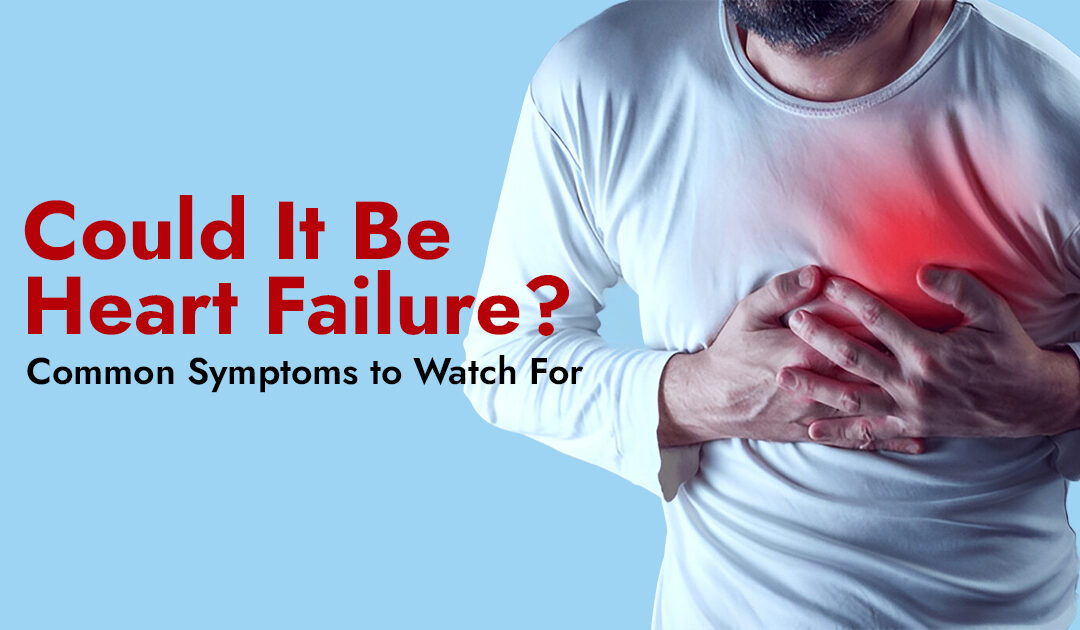-
Could It Be Heart Failure? Common Symptoms to Watch For
Congestive heart failure is a condition that develops due to your heart not pumping enough blood to suit your body’s requirements. When your heart fails to pump enough blood, heart failure occurs. This is a medical condition that needs serious care.
In India, the prevalence of heart failure is estimated to be 8 to 10 million people. However, this estimation isn’t constant and keeps varying between 1.3 and 23 million.
Heart failure can either be acute or chronic, depending on the severity of the condition. It can affect one or both sides of your heart. For instance, left-sided heart failure has different causes as opposed to right-sided heart failure. More often than not, heart failure is a consequence of another medical condition that damages your heart. These medical conditions include coronary heart disease, heart inflammation, high blood pressure, cardiomyopathy, or an irregular heartbeat. It’s a myth that you experience the symptoms of heart failure right away. In reality, it’s a gradual process that makes you experience fatigue, shortness of breath (dyspnea), and fluid buildup in your lower body, stomach, or around your neck.
Heart failure doesn’t merely impact your heart but can also damage your kidneys or liver. Other comorbid conditions could be pulmonary hypertension or heart conditions such as irregular heartbeat and heart valve disease. In the worst scenario, it could also be a sudden cardiac arrest.
Symptoms:
The symptoms of heart failure vary depending on the type of heart failure you experience and its severity. Considering you have mild heart failure, you may not have any symptoms except during difficult menial tasks. Symptoms also depend on whether you have left-sided or right-sided heart failure. However, it is possible that you may also experience symptoms of both the sides. Your symptoms worsen over time as your heart grows weaker. Heart failure, if not treated at the right time, could have life-threatening consequences.
Your first symptom could be something as simple as experiencing shortness of breath or dyspnea while climbing stairs or performing other routine activities. As your heart gradually weakens, you start experiencing it while doing something usual, such as simply walking across the room or getting dressed. Some people have also complained of shortness of breath even while lying flat. Older adults, on the other hand, may only experience confusion and fatigue because of the lack of an active lifestyle.
Here are the symptoms depending on the side of heart failure.
If you have left-sided heart failure, you may experience:
- Dyspnea: shortness of breath
- Cough
- Fatigue (extreme tiredness despite rest)
- General weakness
- Bluish color of fingers and lips
- Sleepiness and trouble concentrating
- Inability to sleep lying flat
If you have right-sided heart failure, you may experience:
- Nausea (feeling sick in the stomach) and loss of appetite
- Pain in your abdomen (the area around your stomach)
- Swelling in your ankles, feet, legs, abdomen, and the veins in your neck
- Needing to pee often
- Weight gain
Heart failure has a lot of serious consequences if not taken care of. Kidney or liver damage is caused by decreased blood flow and fluid accumulation in your organs. Fluid may accumulate in or around your lungs. Malnutrition caused by nausea and swelling in your abdomen (the area surrounding your stomach) can make eating difficult. Reduced blood flow to the stomach can make it difficult to absorb nutrients from your food. Heart failure can also induce abnormal heartbeats, bleeding heart valves, and abrupt cardiac arrest. This disease may also induce pulmonary hypertension.
Risk Factors:
Heart failure can be caused by the following:
- Unhealthy behaviors such as smoking tobacco, eating foods high in cholesterol, sodium, and fat, leading to a sedentary lifestyle, and excessive alcohol consumption.
- Long-term health conditions such as obesity, high blood pressure, diabetes, sleep apnea, chronic kidney disease, anemia, and iron overload.
- Family history of early heart disease.
- Common in men than women.
Prevent heart disease by adopting a healthy lifestyle and aiming for a healthy weight. Get enough physical activity, quit smoking, and meditate to maintain stress levels at a regular level. Work with a healthcare provider to reduce conditions adding to your heart failure risk, such as diabetes, hypertension, and obesity.
Consult your doctor if you’re experiencing any of the symptoms and let them know if you have any risk factors for heart failure. Your doctor may order blood tests (BNP), echocardiography, or imaging tests such as a cardiac CT or MRI scan to check the area and level of severity. It’s always a good choice to get yourself tested at an earlier stage so that you can take care of your heart health sooner.

